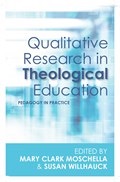
Qualitative Research in Theological Education: Pedagogy in Practice
Date Reviewed: April 16, 2019
If you are looking for a current collection of essays about the state of qualitative research in theological education, then this volume edited by Moschella and Willhauck will be extraordinarily useful. The contributors offer a broad-based, international approach to their topic, complete with case studies and a select bibliography. Together, they argue that qualitative research is essential to the formation of ministers and theological scholars.
Moschella’s introduction provides a concise overview of how this collaborative project began, key themes in the field of ethnographic studies, and how each of the essays addresses these issues. There is real value here for the reader who is just plunging into the study of qualitative research and needs an overview of how the discipline is developing.
This is a handbook in four parts, with fifteen chapters. As such, it is designed for both reading and reference. In addition to the introduction, most readers will benefit from the first two entries that comprise
Part One, “Exemplary Research Essays.” Whitmore’s essay, “Theology as Playbook and Gamefilm: Explaining an Ethnographic Approach to Theology to a Sports-Centred Culture,” uses sports analogies to underscore the vital connection between theology and practice. This is one of several essays that emphasize the theological nature of ethnographic research. For theological educators, this is an important contention which broadens the discussion beyond contrasting qualitative versus quantitative methods and goals. Just how inclusive that discussion can become is indicated by Sorajjakool and Prachyapruit in “Qualitative Methodology and Pedagogy: A Study of the Lived Experiences of Thai Peasants within the Context of Western Development Ideology.”
Part Two, “Issues in Education and the Practice of Research,” includes ten chapters that emphasize the embodied and contextual nature of qualitative research. They are also a reminder that the interdisciplinary nature of this work is a necessary and fitting response to the complexity and messiness of real life. While there are several strong essays in this group, particular note should be taken of “Promoting the Good: Ethical and Methodological Considerations in Practical Theological Research” by Graham and Llewellyn, along with “Just Don’t Call It ‘Ethnography’: A Critical Ethnographic Pedagogy for Transformative Theological Education” by Wigg-Stevenson.
Part Three, “Integrating Qualitative Research into Theological Education”, includes Mellott’s “Qualitative Research in Theological Curricula” and Clarke’s “Wonder and the Diving Dance: The Lived Reality of Qualitative Research within a Master of Divinity Curriculum.” Both essays are valuable for theological educators and will repay rereading. The concluding section, Part Four, “Valediction,” is a single essay by Willhauck, “The Gift and Challenge of Qualitative Methods for Pastoral Formation.” Four major themes for teaching qualitative research are identified and briefly discussed including: contextualization, communication, reflection/reflexivity, and vocation (264). Willhauck’s elaboration on these themes makes a fitting conclusion to this extraordinarily rich and suggestive resource.